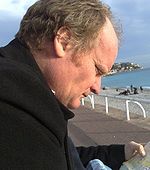Difference between revisions of "Advisory Board"
Lars Hellan (Talk | contribs) |
Lars Hellan (Talk | contribs) |
||
| Line 23: | Line 23: | ||
With some background in philology and philosophy, he was brought up as an early-generation generative grammarian, with Norwegian as main field. Being theoretically first oriented towards Government-Binding theory and Montague Grammar, he later - late 90ies - moved more towards constraint-based frameworks such as HPSG, and got interested in computational grammar implementation. Since early 90ies he has also been interested in typologically oriented research. | With some background in philology and philosophy, he was brought up as an early-generation generative grammarian, with Norwegian as main field. Being theoretically first oriented towards Government-Binding theory and Montague Grammar, he later - late 90ies - moved more towards constraint-based frameworks such as HPSG, and got interested in computational grammar implementation. Since early 90ies he has also been interested in typologically oriented research. | ||
| − | (More details | + | (More details can be seen on [[ Hellan_CV09+public ]].) |
<br> | <br> | ||
<br> | <br> | ||
Revision as of 13:36, 5 May 2010
The TypeCraft Advisory Board are linguists who have agreed to give TypeCraft annotators help concerning their annotations and the on-line representation of their data. Every language family or group of languages represented in TC has its own Advisor; at present we have six advisors; we are still looking for an advisor for the Sami languages. In addition a technical and an administrative advisor will join the team of experts.
Contents
Biographies
Felix Ameka
Felix K. Ameka lectures in the Department of African Languages and Cultures of Leiden University and is also an Associate Researcher of the Language and Cognition Group at the Max Planck Institute for Psycholinguistics, Nijmegen. He has a wide range of interests and has fieldwork experience in Australia and West Africa. Apart from the description and documentation of languages, he is interested in the cultural, cognitive and human social interactional motivations of grammar and how speakers use grammar. He has conducted field-based research and published extensively on the grammar, semantics, and pragmatics of Ewe, his mother tongue, and on other West African languages like Akan. He is currently involved in and coordinates the documentation of four of the little studied Ghana-Togo-Mountain languages: Likpe, Logba, Nyagbo and Tafi and recently Guang languages. These languages are massively influenced by surrounding bigger languages like Ewe and Akan.
As a trained linguist, he has a continuing concern about the role of native knowledge in documentary linguistics. He is also interested in the challenges that documentary linguistics poses for linguistic training and academic linguistic practices.
His other research interests lie in typology and comparative grammar; anthropological linguistics, ethnography of communication, cross-cultural semantics and pragmatics. He is also interested in how the structure and semantics of languages are affected and modulated over time and when they come into contact with other languages.
Lars Hellan
With some background in philology and philosophy, he was brought up as an early-generation generative grammarian, with Norwegian as main field. Being theoretically first oriented towards Government-Binding theory and Montague Grammar, he later - late 90ies - moved more towards constraint-based frameworks such as HPSG, and got interested in computational grammar implementation. Since early 90ies he has also been interested in typologically oriented research.
(More details can be seen on Hellan_CV09+public .)
Mary Esther Kropp Dakubu
Mary Esther Kropp Dakubu has been working on languages of West Africa, particularly languages spoken in Ghana, since about 1962, and has been associated with the University of Ghana since 1964. She received her PhD in West African Languages from the School of Oriental and African Studies, University of London, after a BA (English and Philosophy) from Queeen's University, Kingston ON Canada and an MA in Linguistics from the University of Pennsylvania. For her (relatively) recent publications follow this link to her user page
Abdulaziz Y. Lodhi
Abdulaziz Y. Lodhi (1945, Zanzibar), was educated in Zanzibar, Daressalaam, Stockholm, Gothenburg.
Since 1970 he has been working with Swahili and East African Bantu languages, has conducted fieldowork in East Africa and India and as founder of Swahili and Bantuistics in the Nordic countries, he has published extensively on various branches of Swahilistics at Uppsala University since 1974. His PhD from Gothenburg is on language contacts and Oriental loans in Eastern Africa. Since 2003 he has been working on Swahili lexicography projects in Nairobi and Daressalaam.
His other research interests are history and cultural anthropology of the Swahili Coast and East African Diaspora in the Indian Ocean.
For details please visit please visit my homepage
Marc van Oostendorp
Marc van Oostendorp is not only a phonologist who works for the Meertens Institute in Amsterdam and a professor at the University of Leiden, but also a 'internet pioneer'. He for examples has built the project Laurens Janszoon Coster which is a comprehensive on-line collection of Dutch literary masterpieces. He is an active member of the Esperanto community.
In phonology Marc works on phonological microvariation, that is, the study of those phonological features that determine the differences between dialects or social classes.
Gautam Sengupta
Gautam Sengupta teaches linguistics and cognitive science at the University of Hyderabad, India, where he is currently an associate coordinator of the Center for Neural and Cogntive Sciences. He studied linguistics and philosophy at the University of Massachusetts at Amherst. His areas of interest include formal syntax and semantics, philosophy of language and experimental psycholinguistics. link title


